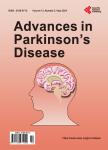Effect of Abnormal Posture on Quality of Life in Patients with Parkinson’s Disease
Effect of Abnormal Posture on Quality of Life in Patients with Parkinson’s Disease作者机构:Noborito Neurology Clinic Kawasaki Japan Division of Neurology St. Marianna University School of Medicine Kawasaki Japan
出 版 物:《Advances in Parkinson's Disease》 (帕金森(英文))
年 卷 期:2016年第5卷第2期
页 面:7-14页
主 题:Parkinson’s Disease Abnormal Postural Quality of Life Parkinson’s Disease Questionnaire (PDQ)-39
摘 要:Background: Relationship between abnormal posture and QOL of Parkinson s disease is not clear. Objectives: To clarify the association between quality of life (QOL) and abnormal posture in patients with Parkinson’s disease (PD) and examine which QOL dimensions are involved. Methods: This study retrospectively examined PD patients (n = 57) who had undergone outpatient rehabilitation between January and March 2014. Evaluation items were Modified Hoehn Yahr (H-Y) stage, Unified Parkinson’s Disease Rating Scale (UPDRS)-Part III score, Timed Up and Go test (TUG, 3-m walking) result, Parkinson’s Disease Questionnaire (PDQ)-39 score, and the angle of forward and lateral trunk flexion in the standing position. Statistical analysis was performed to reveal the relationship between the total PDQ-39 score and individual evaluation items and which QOL dimensions were affected by abnormal posture due to forward or lateral flexion. Results: A total of 38 PD patients (17 men, 21 women;mean age, 73.2 ± 8.6 years) were enrolled. Among the evaluation items, lateral flexion angle showed a significant correlation with the total PDQ-39 score (r = 0.422, P = 0.008). PDQ-39 dimensions showing an association with forward flexion were activities of daily living (ADL) (P = 0.002) and communication (P = 0.007), whereas ADL (P = 0.004), communication (P = 0.021), and social support (P = 0.029) were associated with lateral flexion. Mobility was not associated with forward or lateral flexion. Conclusion: The present findings revealed a correlation between lateral flexion and QOL in PD patients. Among the PDQ-39 dimensions, ADL and communication were associated with abnormal posture.



